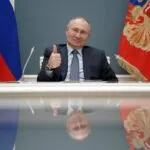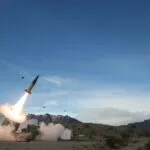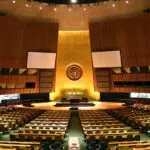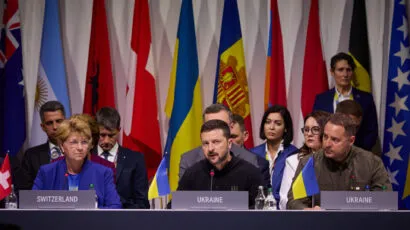Germany debates nuclear weapons, again. But now it’s different.
By Ulrich Kühn | March 15, 2024
 In March 2022, the German government decided to purchase 35 US F-35 aircraft at a price of $8.4 billion to replace Germany’s aging “dual-capable” aircraft. Here, an F-35A aircraft carries a test article of the upgraded B61-12 nuclear gravity bomb at the Nellis US Air Force Base, Nevada in September 2021. Germany will use this combination to maintain its nuclear capability using US-owned bombs. (Photo: US Air Force/Zachary Rufus)
In March 2022, the German government decided to purchase 35 US F-35 aircraft at a price of $8.4 billion to replace Germany’s aging “dual-capable” aircraft. Here, an F-35A aircraft carries a test article of the upgraded B61-12 nuclear gravity bomb at the Nellis US Air Force Base, Nevada in September 2021. Germany will use this combination to maintain its nuclear capability using US-owned bombs. (Photo: US Air Force/Zachary Rufus)
Germans are debating nuclear deterrence—again. They did so when US President Donald Trump won the White House in 2016; when he almost wrecked a NATO Summit in 2018; when French President Emmanuel Macron offered Europeans a strategic nuclear dialogue in 2020; and when Russia invaded Ukraine in 2022. Now that Trump, poised to be the Republican candidate to this year’s presidential election, has casually threatened not to come to the defense of NATO allies should one of them be attacked, Germans cannot help but looking for deterrence alternatives again—including nuclear weapons.
But why would one worry since these musings come and go without any noticeable consequences? Well, there are consequences, and a perfect storm is now brewing in Berlin, one that might ultimately blow away the last remains of Germany’s once deeply ingrained identity of a “civilian power.”
What are Germans debating exactly? As I argue in a new book I edited, Germany is both security dependent and politically conservative. The country depends on the United States and a somewhat benevolent security environment to balance its competing interests in deterrence and disarmament. Its political conservatism leads German decision-makers to preserve as many as possible of these interests, even if external conditions change significantly. The combination of dependency and conservatism can ultimately result in inertia, tying German leaders’ hands and making the country appear indecisive and anxious.
Today, fear is palpable as Germans are debating a question that sounds like it was taken right from the early Cold War playbooks: What if the United States abandons Europe in face of a Russian aggression? In this debate, Germans quickly come up with answers: (1) a somewhat Europeanized deterrent, based on French and British nuclear forces, (2) Germany co-financing the French force de frappe in exchange for greater security assurances from Paris, or (3) a German bomb.
In all this, Germans still do not bother to discuss plausible proliferation strategies, including their costs and risks. Instead, hilarious proposals are making the rounds in Germany’s most-read newspapers. One such proposal suggests a “Eurobomb,” with the nuclear command-and-control suitcase constantly “roaming” between EU capitals. Another recommends that Europeans immediately buy 1,000 “nonactive” US strategic warheads and missiles in conjunction with Germany revoking its membership in the Treaty on the Prohibition of Nuclear Weapons, also known as the ban treaty. (Germany never signed the treaty.)
What is perhaps most striking is that no one in Germany dares to ask whether any of these proposals would ultimately make Germany—and Europe—any safer. As Barbara Kunz, an expert on French security policy, and I wrote: “[T]he thinking [in Berlin] seems to be based on a relatively simplistic approach where nuclear weapons equal deterrence, which equals more security. Accordingly, possessing the bomb serves as some sort of life insurance, simply by the fact that the bomb is there. The fact that the reality of nuclear deterrence is obviously more complex … plays no role in the German debate.”
What’s different this time? The latest iteration of the German nuclear debate nevertheless shows some key differences from previous ones. First, it takes place in a European security environment that has moved much closer to the scenario of US abandonment and Russian aggression than most assumed back in 2016, when Trump rattled Europeans for the first time. As a consequence, proliferation chatter is not an exclusively German specialty anymore. Most notably Polish leaders, including President Andrzej Duda and new Foreign Minister Radoslaw Sikorski, have publicly mused about nuclear weapons other than the United States’.
Second, while the early German nuclear debates featured mostly pundits, journalists, and some political backbenchers, those who now favorably discuss deterrence alternatives increasingly include current and former heavyweights from across the political spectrum. They include Friedrich Merz, Wolfgang Schäuble, and Manfred Weber from the Conservatives, Sigmar Gabriel and Katarina Barley from the Social Democrats, and Joschka Fischer and Sergey Logodinsky from the Greens. When Germany’s Finance Minister Christian Lindner from the Free Democrats joined the chorus in mid-February, Chancellor Olaf Scholz finally had to put his foot down: He reminded his fellow coalition partner that “Germany decided a long time ago not to seek its own nuclear weapons.”
Third, nuclear disarmament—a central pillar of post-Cold War German foreign and security policy—does not play a role in the German public discourse any more. When in March 2022 Annalena Baerbock, Germany’s Foreign Minister from the Greens, urged Germans in response to Russia’s aggression against Ukraine to “understand disarmament and arms control as being complementary to deterrence and defense,” everyone in Berlin got the point. A recent comparative analysis of Bundestag statements found that the word “disarmament” barely showed up in parliamentary debates in 2022—a stark difference with previous years. Prior iterations of the German nuclear debate had seen multiple expert interventions in favor of disarmament and arms control policies. But these voices have mostly gone silent now.
Fourth, a newfound hawkishness has come to dominate the German media discourse. Fueled by a few dozen hardline think tankers and politicians, restraint—in every form, including the obvious limitations of a mutual deterrence relationship with Russia—is considered weak and a sign of fear of Russia. “Self-deterrence” is the main charge levelled against Scholz to dismiss every consideration of potential escalation pathways vis-à-vis Russia.
All this happens on the back of a shift in public opinion. Latest surveys show that Germans see nuclear weapons much less negatively than in the past. In a poll conducted by German pollster Infratest-dimap in mid 2022, for the first time in decades a majority of respondents said they welcomed US nuclear weapons deployed on German soil. When the German nuclear debate kicked off in 2016, nuclear skeptics could still claim that the entire discussion was out of touch with Germans’ long-standing preference for nuclear abolition. Today, that is no longer a clear-cut case.
What’s next? So far in the debate, the shifting parameters have not gone so far as to lead the government to pursue any visible changes to Germany’s deterrence arrangements. No less important, 90 percent of Germans reject the notion that the country should have its own nuclear weapons. The combination of Germany’s security dependence and political conservatism, however, might lead to difficult choices ahead.
A reelection of Trump and subsequent policy changes in US nuclear guarantees to European allies could lay bare the obvious downsides of German dependency. At the same time, German conservatism could force the country to search for deterrence alternatives in such a scenario.
For nearly 70 years, Germany has relied on extended US nuclear deterrence for its security, with successive German governments—including Conservatives, Social Democrats, Free Democrats, and Greens—showing their continued support. Suggesting that Germany would break with that tradition and get rid of nuclear deterrence altogether should Trump withdraw US nuclear weapons from Europe seems hardly realistic. Rather, Germany would more likely probe Paris and London for increased nuclear commitments to Europe’s security.
But should this probing fail—and current rifts between the countries over arms deliveries to Ukraine and military secrecy are not a good omen—Berlin may indeed face the toughest of all decisions about ensuring its own security. Over the years, the recurring German debate about nuclear weapons has pushed the boundaries of what is conceivable in German politics consistently closer to the atom.
Together, we make the world safer.
The Bulletin elevates expert voices above the noise. But as an independent nonprofit organization, our operations depend on the support of readers like you. Help us continue to deliver quality journalism that holds leaders accountable. Your support of our work at any level is important. In return, we promise our coverage will be understandable, influential, vigilant, solution-oriented, and fair-minded. Together we can make a difference.
Keywords: Europe, France, Germany, NATO, United Kingdom, nuclear deterrence, nuclear sharing, nuclear weapons in Europe
Topics: Nuclear Weapons
















And why should our treasure in blood and taxes defend people who won’t defend themselves? We aren’t or rather shouldn’t be the world police when ANY citizen of the US sleeps on a sidewalk or misses meals. We are NO example if our citizens starve and die while we air drop MRE’s and build ports to help supply hamas… Even if they are probably a proxy built by our intelligence goofs and corrupt politicians.
A plain fact of the world is demonstrated by the War in Ukraine: countries with nuclear weapons can do what they will to countries without nuclear weapons. Since the US nuclear arsenal has lost its deterrence value due to loss of political credibility, European nations must acquire a new source of nuclear protection. From a non-proliferation perspective it seems preferrable to use the European Union or some other international organization as the agent of proliferation.
Joschka Fischer is mentioned in passing; his efforts, as Foreign Minister in the 1990s to get NATO to reconsider its first-use policies, i.e., initiation of nuclear warfare, were thwarted. Now, that the poisonous but ineffectual first-use threats by Putin have been experienced, it is time to review NATO policies that maintain the option for nuclear escalation. This article focus on “disarmament” and total lack of attention to risk reduction, leaves the reader with only poor options. The key thing today is to enhance stability in crises (which look to become more frequent). Nothing is less stable than a confrontation between… Read more »
Hello from Germany,
I want to point out, that Friedrich Merz and the CDU are fans of nuclear powerplants.
A technology germany decided to abbandon in 2011.
With the last powerplant closing in 2023.
Since the war in Ukraine they tried to reverse this decision.
An atombomb discussion might be another try to do so.
Germany and most of the European countries have skirted their joint responsibility to NATO. The US paid out more that the combined European countries, while they enjoy 30 day vacation and free healthcare at our expense. It’s time to either join and pay your dues or get out of NATO.
Nuclear weapons are monstrously criminal, evil, terrorist weapons. They are almost instant Gaza for huge countries, for hundreds of millions of innocents, with possibly billions dying in the months and years afterwards. They do NOT provide security, merely a temporary delusion of it, a postponement of war, and an exponential increase in the slaughter of the eventual war. Pointing to the absence of nuclear war for the past 79 years is like jumping from the top of the Empire State Building and, having fallen 79 feet, declaring “so far, so good!”. Perhaps October 7th and the war in Gaza would… Read more »
btw Wolfgang Schäuble is dead since last 26 December 2023…I don’t think he has an opinion anymore !
“Second, while the early German nuclear debates featured mostly pundits, journalists, and some political backbenchers, those who now favorably discuss deterrence alternatives increasingly include current and former heavyweights from across the political spectrum. They include Friedrich Merz, Wolfgang Schäuble, and Manfred Weber from the Conservatives, Sigmar Gabriel and Katarina Barley from the Social Democrats, and Joschka Fischer and Sergey Logodinsky from the Greens”